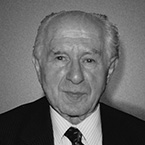
John H. Weisburger, PhD, honorary AACR member and inaugural fellow of the AACR Academy, died February 17, 2014, at the age of 92. Weisburger was research professor of pathology in the Graduate School of Basic Medical Sciences at New York Medical College, in Valhalla, New York. His research focused on the etiology of cancer.
Born Sept. 15, 1921, Weisburger received his doctorate at the University of Cincinnati, in Ohio, in 1949 and became a U.S. Public Health Service research fellow with the National Cancer Institute (NCI) in 1950.
At the NCI, Weisburger studied the effects of environmental chemicals on the alteration of the structure and function of DNA, contributing pioneering work on the mechanism of the carcinogen 2-acetylaminofleorene. He was named head of the Carcinogen Screening Section at the NCI and later, director of the Bioassay Carcinogenesis Programs, where he explored new methods of testing chemicals for carcinogenicity.
Soon after it was established and designated by the NCI as a specialized center for cancer prevention, Weisburger joined the American Health Foundation, which brought together scientists of many disciplines to study the effects of lifestyle on the causes and contributing factors of cancer induction and development. He established a research program in nutrition and cancer, which focused on heterocyclic amines in cooked foods and on tea as a chemopreventive agent.
Weisburger was an AACR member for more than 63 years. He served on the editorial board of Cancer Epidemiology, Biomarkers & Prevention, and was a member of the DeWitt S. Goodman Lectureship Committee.
In addition to his election to the inaugural class of Fellows of the AACR Academy in 2013, Weisburger’s stellar contributions to cancer research have been recognized with numerous other awards and honors, including Distinguished Service medals from the American Society of Preventive Oncology, the American Health Foundation, and the New Jersey Commission for Cancer Research; the Ambassador of Toxicology Award from the Mid-Atlantic Chapter of the Society of Toxicology; the Meyer and Anna Prentice Award from the Michigan Cancer Center; the Merit Award from the Society of Toxicology; and an honorary medical degree from the University of Umeå, in Umeå, Sweden. Additionally, he was a charter member of the Society of Toxicology and honorary life member of the Japanese Cancer Association.
Be the first to add a Remembrance.